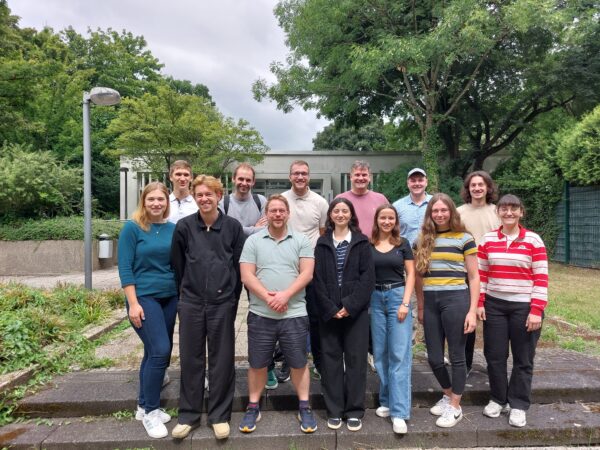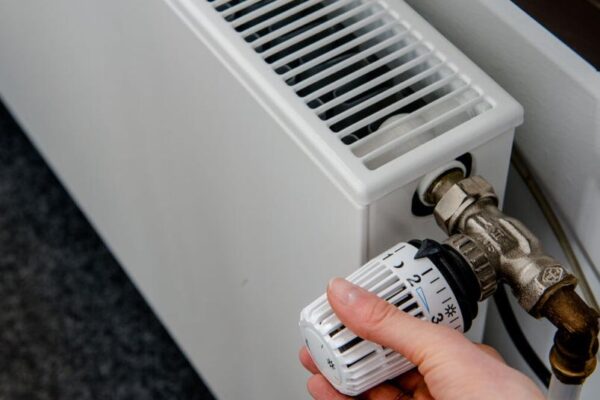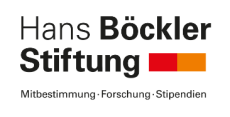Macroeconomics
About us
The Chair of Macroeconomics conducts research primarily on topics related to economic and social transformation. These include sustainability transformation and digitalization. Economic change is a very complex phenomenon that is difficult to capture with neoclassical equilibrium economics. Therefore, the research of the chair takes place from a complexity-economics and evolutionary perspective. In addition, post-Keynesian, institutional economics and behavioral economics approaches are also used. In addition to paradigmatic pluralism, methodological pluralism is also practiced at the Chair. While the methodological focus is on agent-based modeling, methods of experimental economic research and qualitative methods such as scenario analyses and surveys are also used. The chair is open to interdisciplinary collaboration. Our research has a strong application and policy orientation.
Team
Teaching
Information on:
The modules of the Chair of Macroeconomics are structured in such a way that each module builds upon the previous module. It is therefore recommended to take them in a certain order.
Bachelor:
| Module | Semester | Requirements |
| Fundamentals of Macroeconomics | 1./2. Semester | none |
| Macroeconomic Analysis | 3./4. Semester | Fundamentals of Macroeconomics |
| Ecological Economics | 3. – 5. Semester | Fundamentals of Macroeconomics |
| Macroeconomic Simulation | 4. – 6. Semester | Fundamentals of Macroeconomics |
| Bachelor Thesis | 6. Semester | Fund. of Macroeconomics, term paper |
Master
| Module | Semester | Requirements |
| Macroeconomics | 1./2. Semester | none |
| Advanced Macroeconomic Simulation | 2./3. Semester | Macroeconomics |
| Macroeconomics & Sustainability | 2/3. Semester | Macroeconomics |
| Project seminar | 3. Semester | Macroeconomics, AMS oder M&S |
| Master Thesis | 4. Semester | Macroeconomics |
Please take into account the general information on formal standards in the Guidelines on how to write papers and theses
The guide was designed to help and support you in the process of writing your research paper.
Basic Information
The Bachelor’s thesis is the final part of your first academic degree. It should demonstrate that you have acquired an in-depth understanding of scientific topics and can independently answer a question using scientific methods. This means that to successfully complete your Bachelor’s thesis, you must demonstrate that you have developed good skills in critical thinking and scientific analysis during your studies.
For a Bachelor’s thesis at the Chair of Macroeconomics, you must demonstrate at least a good command of the methods taught in the compulsory module “Fundamentals of Macroeconomics”. This applies particularly to students who have been allocated to our Chair by lottery. A mere paper that only summarizes the content of other papers, but does not apply any of the research and analysis methods taught by the chair, will generally not lead to a good result.
It is highly recommended to complete at least one of the following modules at the Chair of Macroeconomics (Macroeconomic Analysis, Ecological Economics or Macroeconomic Simulation) before writing a Bachelor’s thesis. Ideally, you will be able to apply the knowledge and methods taught in these modules when writing your thesis. The Chair welcomes the use of agent-based modeling, system dynamics modeling or statistical-econometric analysis in your Bachelor’s thesis.
Topics
In principle, the Chair will only supervise topics that are in line with the Chair’s teaching program. The topics must therefore be related to macroeconomics. Other topics will only be supervised in justified exceptional cases.
Typical topics include:
– General macroeconomics (economics, growth, inflation)
– Macroeconomic case studies
– Monetary theory and policy
– Fiscal policy
– Financial crises
– International macroeconomics
– Sustainability, resources and growth
A list of topics that have been written about in the past can be found here
Normally, topics are formulated and assigned to you by the Chair. However, you are invited to suggest your own topic or subject area. If you do not suggest a topic, the Chair will assign you a suitable topic.
Procedure
Bachelor theses will only be supervised at the Chair of Macroeconomics if you follow the Wiwi-BOS procedure. For further information about the application process and application deadlines please read the Wiwi-BOS homepage: https://wiwi-bos.ruhr-uni-bochum.de/frontend/index.php?bereich=allgemein&seite=termine
The Chair is happy to accept topics relevant to one of our specialization modules (Macroeconomic Analysis, Ecological Economics, Macroeconomic Simulation) for your Bachelor’s thesis. If this is not the case, we will permit alternative topics in exceptional cases only.
If you would like to receive a firm commitment for the supervision of your Bachelor’s thesis, please contact the Chair by email (mak@rub.de) and let us know your desired subject area and your previous knowledge of the Chair’s modules. You will then receive feedback and, if applicable, an invitation for a preliminary interview.
If the Wiwi-BOS system assigns you to the Chair of Macroeconomics and you have not received a firm commitment from the Chair beforehand, you can contact the Chair (mak@rub.de) in the week in which the topics are assigned (usually the 2nd week in April or October, please note the actual date in Wiwi-BOS) and submit topic suggestions. If you do not do this, the Chair will independently assign you a topic at the end of the period without further inquiry. Please get in touch early if you want to have a say in the topic you wish to write about. The Chair of Macroeconomics offers a Moodle course to accompany the Bachelor’s thesis (https://moodle.ruhr-uni-bochum.de/course/view.php?id=62122). Please register for this Moodle course as soon as you have been assigned to the Chair. Important information is provided and deadlines are announced in this course.
The examination office will confirm your topic and inform you about your second supervisor (member of the Chair) in mid-April or October. You then have 9 weeks to write your thesis.
During this time three Bachelor colloquia will take place at the Chair of Macroeconomics, which you must attend in person. Therefore, please note the dates for the colloquia in good time.
The 1st Bachelor colloquium usually takes place in the week after the topic has been assigned (see Moodle for the date!). At this meeting you will receive information about the expectations of the Chair and the grading scale and will have the opportunity to clarify whether you have understood your topic correctly.
The purpose of the 2nd Bachelor colloquium is to discuss the structure of your thesis as well as the literature and methods you intend to use. As part of this colloquium, you will give a short talk and presentation lasting 10 minutes, for which you will receive feedback.
The 3rd Bachelor colloquium takes place approximately one week before the submission deadline. In this colloquium, you will give a second lecture with presentation (duration 10 minutes), in which you present your work to date. The presentation will focus on the results you have achieved so far and your conclusions. You will also receive feedback on this, which you can incorporate into your thesis.
The thesis is graded according to a fixed set of criteria, which will be explained in the first colloquium.
The oral Bachelor examination takes place approx. 4 – 6 weeks following submission of the thesis. In the examination, you will be asked questions about your thesis to assess how well you have understood the topic, the literature and the methods used. As you will already have presented your work during the 2nd and 3rd colloquium, no further presentation is required here.
Guidelines
Please refer to the guidelines for all formal requirements for the Bachelor’s thesis. Failure to comply with the guidelines will result in points being deducted.
Guidelines on how to write papers and theses
Supervision
For individual questions, you can contact your second supervisor. A meeting is particularly recommended for clarifying the research question, preparing the outline and choosing the research methods. A meeting is also a good opportunity to discuss your thesis before or after each colloquium. Please note that the Bachelor’s thesis is an independent achievement, so that excessive use of help will result in points being deducted.
Master’s Theses
Can I write my thesis at the Chair of Macroeconomics?
Yes, the Chair of Macroeconomics supervises master theses.
What conditions exist for writing a thesis?
As a rule, you must have already successfully taken part in a seminar at our Chair. You should ideally have an economics focus in macroeconomics. Of course good English language skills and the willingness to engage with original scientific literature is important.
What do I have to do in order to write my thesis at the Chair of Macroeconomics?
If you meet the requirements, you can contact Professor Roos by E-Mail to arrange a meeting.
For more information:
Please take note of the following guidelines before you start working on your dissertation: A guide for the preparation of seminar papers and final theses at the Chair of Macroeconomics:
Guidelines on how to write papers and theses
Here you can find a description of the criteria according to which diploma theses are evaluated at the Chair of Macroeconomics:
Criteria for the Evaluation of Master Theses
Topics
Short title: Statistical determination of the role of energy efficiency to reducing CO2 emissions
The aim of the project is to apply statistical regression analysis on time-series for energy demand in total and by sector to isolate the specific contribution of energy efficiency from four other drivers:
- GDP
- Global warming (reducing the need for heating in winter)
- Energy price (including CO2 costs)
- Changes to the structure of the economy, especially deindustrialisation.
This would be undertaken for selected EU countries and will make an important contribution to the body of knowledge available on the real contribution of efficiency measures. It should therefore lead to recognition for the student and the publication of a good academic paper.
A high quality postgraduate education orientated on current scientific research is an important goal of the chair of macroeconomics.
For this purpose the assistance and the mentoring of the chair’s doctoral candidates follows a structured program.
Furthermore the chair supports the membership of the doctoral candidates in the RUB Research School
The Chair of Macroeconomics offers you several possibilites to convert modules you have achieved while studying abroad or at another German university into credits at the RUB.
On each page you will find all the important information and what you have to pay attention to in order to get the credits.
Furthermore the required forms for the procedure will be provided.
Important Information
- Refrain from asking for credits for obviously unsuitable modules.
- For a transfer of credit for courses in the area of macroeconomics, please contact Matthias Reccius at the Chair of Macroeconomics. Alternatively, if you require a transfer of credit for courses related to international economics (international trade, international finance or international macroeconomics) please contact Prof. Busse at the Chair of International Economics.
- Converting credits from undergraduate / BA / B.Sc courses into MSc courses is usually not possible. Exceptions are only possible if it can be shown that a broad congruence of content is existing.
- If the course attended abroad does not have enough credits or does not cover substantial content it is possible to arrange some type of additional performance eg. an oral examination.
General information on studying abroad
The Chair of Macroeconomics advocates students that are internationally mobile and want to gain experience at foreign universities. Therefore, we are generally willing to transfer credits achieved at a foreign university to credits at the RUB.
In the past problems have occured because students applied for such a credit-transfer only after their time abroad. To avoid such problems, it is necessary to get the consent of the chair before your stay abroad. This is consistent with the practice of the whole faculty. It is not possible to transfer your credits if you did not receive a written consent before your semester abroad. Thus, it is absolutely necessary that you contact the chair beforehand. Please send your inquiries directly to Matthias Reccius.
BSC-/MSC
For students in the BSc/MSc the recognition of credits from foreign universities is very easy. You simply have to get them accreditted to the designated placeholder-modules that can be found in the module handbook. These modules are called Applied Economics I, II & III for BSc students and Advanced Applied Economics I, II & III for MSc students. For these modules, no examination is required. It is only verified whether the level complies with the level of our modules.
Procedure
If you are planning to study abroad and you want to get credits acquired at the foreign university accreddited at the RUB, please proceed as follows:
- Identify courses at the host university and the chair of macroeconomics, which might be similar in content and therefore could be eligible for acknowledgment.
- Get hold of course descriptions of the courses abroad and compare them with the course description of the chair of macroeconomics of the RUB. You have good chances for accreditation when the literature is the same and at least 50% of the subjects that are dealt with coincide.
- Please download the acknowledgment form and fill it out before you hand it in with the other necessary documents.
- Important for ERASMUS-Students: Please organize additionally the document of the International Office, which states the courses you are about to take abroad. This one is supposed to be filled out beforehand, as well as the acknowledgement form.
You can find the acknowledgement form here - Send the acknowledgment form with the course descriptions to Matthias Reccius or bring your documents on paper to the secretary of the department.
- The chair will check the application immediatly and notify you of the result by email. If your accreditation is granted, you can pick up the acknowledgment form signed by Prof. Roos at the chair. Keep the acknowledgment form until your return from abroad.
- After your return please obtain the form for the recognition of foreign credits at the faculty’s examination office and fill it out.
- Attend the consultation hour and bring along this form, an official proof of performance from the host university (e.g. transcript) and the signed acknowledgment form.
Other German Universities
Apart from the possibility to get credits transferred from your study abroad or from modules offered at the TU Dortmund, it is of course possible to convert credits from modules that are offered at other German universities as well.
In order to get those credits converted, it is absolutely necessary that the modules are widely consistent with the modules offered by the chair, both in extent and content.
To find out whether an accreditation is possible please write an E-Mail to Matthias Reccius containing all the important information about the module (Curriculum, scripts, bibliography etc.).
The Bochum International Summer School as well as the Bochum International Spring School were founded by the faculty of economics at the Ruhr-University Bochum. Both are supervised by the Chair of Macroeconomics.
The B.I.S.S. is aimed at students from different economics degree-courses (Bachelor, Masters and Diploma) in Bochum, but from other surrounding universities as well.
The B.I.S.S. offers courses from economics and business administration with international guest lecturers. Both the events as well as the exams are held or written in English.
You can find further information about this program here.
Teaching offers
Research
Research projects
Interested in working for our chair?
Publications
Kemfert, C., Präger, F., Braunger, Hoffart, F.M., Brauers, H. (2022): The expansion of natural gas infrastructure puts energy transitions at risk. Nature Energy (2022). https://doi.org/10.1038/s41560-022-01060-3
Hoffart, F. M; Schmitt, E.-J.; Roos, M. (2021): Rethinking Economic Energy Policy Research – Developing Qualitative Scenarios to Identify Feasible Energy Policies, Journal of Sustainable Development of Energy, Water and Environment Systems, Vol. 9(2), 1080331, DOI: https://doi.org/10.13044/j.sdewes.d8.0331.
Hülsdünker/Hoffart: Von der Notwendigkeit und den Herausforderungen eines zukunftsfähigen 1,5-Grad-kompatiblen Finanzwesens, FJSB, Vol. 34(4), 611-627, DOI: https://doi.org/10.1515/fjsb-2021-0060.
Kemfert, C., Präger, F., Braunger, Hoffart, F.M., Brauers, H. (2022): The expansion of natural gas infrastructure puts energy transitions at risk. Nature Energy (2022). https://doi.org/10.1038/s41560-022-01060-3
Hoffart, F. M; Schmitt, E.-J.; Roos, M. (2021): Rethinking Economic Energy Policy Research – Developing Qualitative Scenarios to Identify Feasible Energy Policies, Journal of Sustainable Development of Energy, Water and Environment Systems, Vol. 9(2), 1080331, DOI: https://doi.org/10.13044/j.sdewes.d8.0331.
Hülsdünker/Hoffart: Von der Notwendigkeit und den Herausforderungen eines zukunftsfähigen 1,5-Grad-kompatiblen Finanzwesens, FJSB, Vol. 34(4), 611-627, DOI: https://doi.org/10.1515/fjsb-2021-0060.
OPENING HOURS SECRETARIAT:
Monday - Thursday: 08:30-15:30
MAILING:
Prof. Dr. Michael Roos
Chair of Macroeconomics
GD 03/307
Ruhr-University Bochum
44780 Bochum
VISITOR ADDRESS:
Ruhr University Bochum
Building GD
Room 03/307
Universitätsstraße 150
44801 Bochum
Phone:
E-Mail:
The chair belongs to the competence field:






